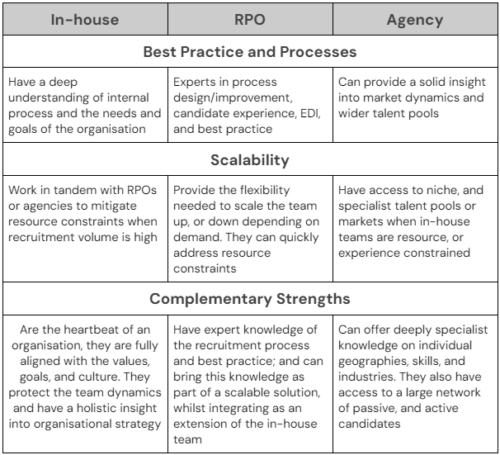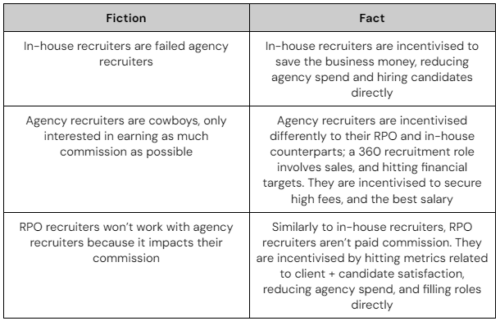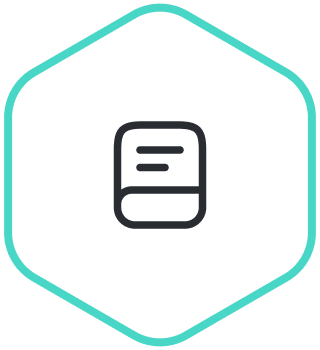The job market is competitive and ever evolving and hiring and retaining talent is at the strategic core of most businesses. This makes the balance between utilising in-house teams, RPOs, and external recruitment agencies as tough as ever. The division between in-house TA teams, RPOs, and external agencies presents a challenge, as well as an opportunity to optimise how we work together. All come with advantages, and disadvantages - and I want to explore the differences, synergies, and collaboration strategies between the different recruitment models.
A Deep Dive: In-House Talent Acquisition Teams
In-house teams manage all of your hiring and recruitment activity: approving new requisitions, sourcing, shortlisting, interviewing, and onboarding new employees. Depending on the size of the organisation you could have a large internal team, or a small 1 or two person team managing all of your recruitment and hiring needs.
Advantages:
- Deep specialisms: If the agency is a specialist, the team is likely structured so each team member focuses on a small portion of the market, industry, or skill set. This means that they can have a much deeper understanding of the market dynamics, and candidate pool
- No hire, no fee: Working on a contingent basis can be appealing, because if the agency can’t introduce the right candidate, then you’re not liable to pay any fees
- Extended network: Agency recruiters spend a lot of time cultivating and maintaining relationships with industry experts and professionals, allowing them access to a pool of qualified candidates quickly
- New markets: If you’re expanding into new geographies, or hiring for a new skill set, recruitment agencies can support when you don’t have the market knowledge or capacity to do so in-house
Challenges:
- Cost control: Agencies are expensive, hiring fees can range anywhere between 15-35% depending on the market, and seniority of the hire. This means costs can quickly spiral, especially when you’re hiring multiple high salary candidates
- Key motivators: Agency recruiters are incentivised differently to their in-house and RPO counterparts; they are incentivised to fill positions for the highest fee and salary possible - allowing them to hit their sales KPIs and ultimately, earn commission
- Candidate experience: When you are working with an agency, you lose control over the way they engage and communicate with prospective candidates; which can be damaging to your brand and reputation, and can be particularly difficult to turn-around when you operate in a niche, or emerging market
- Process adherence: Agencies aren’t incentivised to adhere to your internal recruitment processes, and will actively target the hiring community and circumnavigate your in-house, or RPO recruitment teams (who are often tasked with reducing agency spend) creating fractured processes, poor candidate experience, and additional work for your team
Opportunities for Collaboration and Synergies
You might not agree with how different recruitment models incentivise their teams, but we’re all incentivised and motivated differently, and we all solve different problems for the businesses we are a part of, or support.
So how do we work together, whilst being mindful of our individual and team objectives/KPIs, as well as the wider business deliverables?

Broken Industry: A Call for Collaborative Change
It’s no secret in the industry that in-house teams, RPOs, and recruitment agencies have reservations about cross-collaboration, and my goal in 2024 is to explore, and optimise how these teams work together to further strengthen an organisation’s hiring capabilities and ability to hire business critical roles. The norm right now is that we are all pitted against each other. Agency recruiters are taught to by-pass internal teams, internal teams are tasked with reducing agency spend, and RPOs are tasked with filling a %age of roles directly for their client. This leads to industry wide inefficiencies, broken processes, and poor candidate experience - and ultimately, hinders hiring outcomes.
We work against each other - not with each other. So, let’s change the narrative.

There isn’t a one size fit’s all solution - but we need to find a way to work together that positively impacts our hiring potential.
There are some systemic industry wide bad practices that need to be addressed, but for now - let’s focus on what we can do to work in a more collaborative way.
- Peer led learning: We all have strengths, we all have blind spots - let’s leverage our collective knowledge and elevate ourselves. Run training sessions and round table events to share best practice, and tricks of the trade. This will give all of us a more holistic view of the recruitment process, and make us all better at our individual jobs.
- Process implementation and objective sharing: Be clear on, and agree processes and ways of working that allow in-house teams, RPOs and agencies to work together, without treading on toes. Ensure everyone is aligned on objectives and focus on values fit, quality or hire, and wider organisation goals; ensure metrics are set that allow everyone involved to remain aligned.
- Feedback and iterate: Communicate openly and regularly; discuss blockers, bottlenecks, and sticking points to hone and develop hiring techniques. Share feedback regularly, constructive and positive.
Conclusion
By collaborating more effectively we can all benefit from improved hiring outcomes, streamlined processes, enhanced candidate experience, and access to larger, more diverse talent pools. This will help improve the industry’s reputation and further enhance our ability to hire high-calibre talent, and lead to longer term sustainability in an ever evolving market. Collaboration doesn’t mean one side comes out on top - it means we all pool our expertise and resources together for better outcomes. In-house teams, RPOs, and recruitment agencies working together will help us shift the narrative from competition to collaboration and foster the growth of a more efficient and effective talent acquisition ecosystem together.




